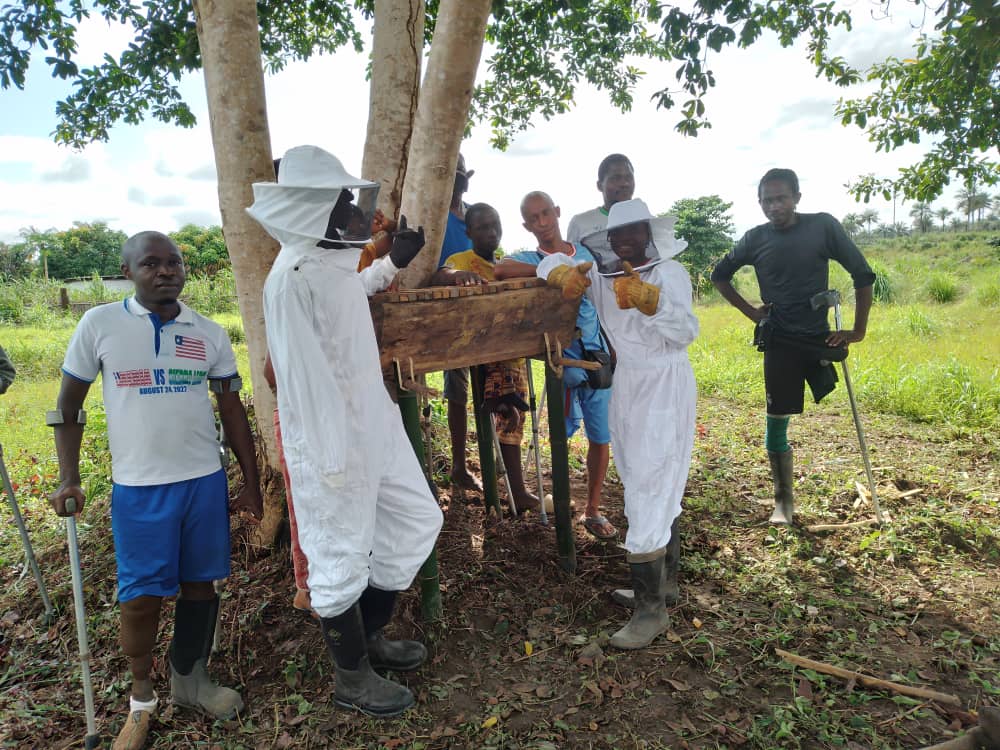In a country like Sierra Leone where life is a daily struggle, even for those who are fit and well, it is difficult to overestimate the impact of losing a limb. However people who have experienced an arm or leg amputation are not uncommon in the country.
For the older people this is frequently due to the Civil War. Jeremiah (far left of picture) lost his leg at the age of 14 when his school was stormed by rebels. He was shot in the leg and managed to roll into a ditch to survive and avoid being taken as a child soldier by the rebels. When he was found, four days later, infection had set in and his leg was amputated. Younger people lose limbs after motorcycle accidents or compound fractures. Health care is expensive, journeys difficult and many people cannot afford to go to hospital. Often care is delayed until the only option is amputation.
Rory’s Well has teamed up with an amazing organisation called SLASA (Single Leg Sports Association) which initially helped amputees through football and now also supports livelihood training so that people no longer need to survive by begging.
Our first disabled bee-keeping trainees are now harvesting their own honey!
Rory’s Well started bee-keeping training in 2018 in partnership with Bees Abroad Home – Bees Abroad which offers expert support and training for bee-keeping projects overseas.
African bees are smaller than European honey bees and have a reputation for ferocity. When we first visited Barri Chiefdom the only honey for sale had been collected from wild colonies by climbing the trees where they built their nests, and smoking out or setting fire to the colonies. This was dangerous to both the bees and the honey hunters and resulted in a very dark, dirty honey.
Our first trainees were honey hunters who were amazed at the clear, golden honey which could be harvested from their hives, without destroying the colony.
Our team of bee-keeping trainers now support 244 registered bee-keepers with a total of 660 hives, across the area. The trainers give ongoing advice and help with harvesting when required.
Sealed honeycomb is brought to a honey processing centre where the honey is extracted, quality tested and the bee-keeper is paid by the Barri Bee-farmers Association, which is linked to PAD-SL our local NGO partner.
BBA is then responsible for the hygienic packaging and marketing of the honey which is sold locally and also exported in bulk to a partner charitable organisation in Liberia.
The team were delighted when their honey won First Prize at the 2023 British National Honey Show in the class ‘Clear Honey from a Charitable Organisation with Beekeepers’. There was particular jubilation that they had beaten the entry from the much larger Liberian organisation!
The method used to extract honey from the natural honey comb also produces a lot of beeswax which is valuable in it’s own right. It can be sold on as wax and we are also teaching people to make wax based products in the villages.
We train villagers to combine wax with vegetable oils to make creams and ointments. Currently we make a lip balm, body cream and insect repellent cream. The insect repellent cream includes Neem oil, a natural mosquito repellent and is very popular, especially during the rainy season.
Whilst we train both men and women, and have 16 female bee-keepers registered in their own names, with many more assisting their husbands; the production of creams and ointments particularly appeals to the women’s groups, and we assist them to set up small businesses to sell these creams locally.
Fatimata was one of our first trainees, with her husband, but when he died she had to give up her bee hives to concentrate on caring for her six children. She now makes creams in the village and sells them locally in the market. With money which she earns from this, she has been able to pay people to help her farm and has set up a thriving swamp rice farm just outside the village.
Bee-keeping is also a ‘Forest-friendly’ livelihood which enhances the environment and improves pollination of local crops. We are encouraging the planting of native trees within the villages which provide nectar for the bees and oil for the making of creams.
It’s difficult to find a downside to an initiative which can be undertaken by anyone and helps the environment and livelihoods with a very low capital investment-except of course the stings!
Tailors are now doing well by producing protective bee suits, and the village leaders have let it be known that anyone using one of these to climb a tree or burn out the bees will have to answer to them!
If this story interests you and, like me, you need to focus on positive action to counter the pervasive anxiety we all feel about the future of our world, there are many things which you could do:
Fundraising www.roryswell.org/donate.html
Partnerships– could your organisation support this work in some way?
Personal Connections– get in touch via our website www.roryswell.org , attend some of our events, spread the word…









